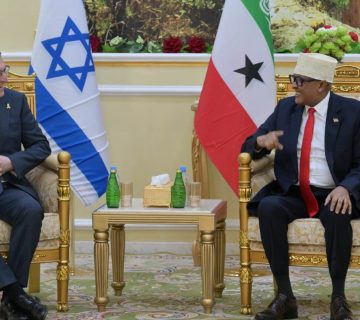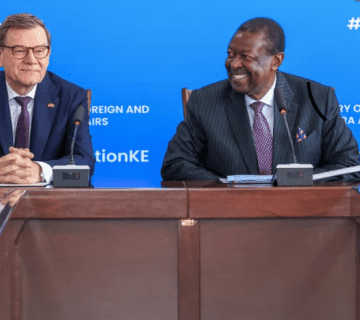The Horn of Africa, a region often synonymous with protracted conflicts, resource disputes, and fragile state structures, has witnessed a historic breakthrough in peace diplomacy, spearheaded by Turkey under the leadership of President Recep Tayyip Erdoğan. The Somalia-Ethiopia meeting held in Ankara culminated in the Ankara Communiqué, a landmark agreement that underscores the importance of constructive partnerships for peace, economic cooperation, and regional stability. Central to this agreement was Ethiopia’s affirmation of respect for Somalia’s independence, sovereignty, and territorial integrity—a significant stride towards addressing a contentious diplomatic crisis.
Resolving a Yearlong Crisis
On December 11, 2024, President Erdoğan brought Somali President Hassan Sheikh Mohamud and Ethiopian Prime Minister Abiy Ahmed together for a pivotal meeting—the first meeting between the two leaders in over a year. The seven-hour negotiation marked the resolution of a diplomatic standoff that began with the controversial signing of a Memorandum of Understanding (MoU) on January 1, 2024. This MoU, between Ethiopia and Somaliland—a self-declared breakaway region of Somalia—bypassed the Somali federal government, provoking outrage in Mogadishu and escalating tensions. The perceived affront to Somalia’s sovereignty not only threatened diplomatic ties but also risked exacerbating instability in an already volatile region. Turkey’s involvement in resolving this crisis showcased its growing influence as a peace broker in global diplomacy. Initiated by Turkish Foreign Minister Hakan Fidan, the Ankara Process began in July 2024 as a series of back-channel dialogues and high-level meetings. These efforts included discussions in Ankara, Ethiopia, and on the sidelines of the U.N. General Assembly in New York. By fostering open communication and prioritizing mutual interests, Turkey prevented the crisis from escalating into open conflict, culminating in the Ankara summit and its consequential declaration.
Key Takeaways from the Ankara Declaration
The Ankara Declaration’s significance lies in Ethiopia’s commitment to uphold Somalia’s sovereignty and territorial integrity, as stipulated under international law. It emphasized collaboration through formal agreements with the Somali federal government, signaling Ethiopia’s willingness to abandon unilateral dealings with Somaliland regarding sea access and port utilization. This shift represents a significant step toward restoring trust and fostering regional cooperation. While the declaration did not explicitly nullify the disputed MoU, its emphasis on “forgoing differences and pursuing shared prosperity” suggests that the agreement has effectively been shelved. This diplomatic compromise aligns with the recent political changes in Somaliland, particularly the election of Abdirahman Mohamed Abdullahi, whose administration has demonstrated a conciliatory approach toward Mogadishu.
The declaration also opens avenues for addressing broader shared challenges, including the fight against terrorism, particularly threats posed by al-Shabaab and Daesh (ISIS). Additionally, it lays the groundwork for economic partnerships, enhancing infrastructure development, trade, and investment opportunities in the region.
Turkey: A Reliable Mediator
The success of the Ankara Process underscores Turkey’s growing role as a trusted mediator in global and regional conflicts. Unlike other major powers, such as the United States, European Union, or China, whose engagement in the Horn of Africa has often been narrowly focused on counter-terrorism or resource-driven investments, Turkey has embraced a multidimensional approach. This includes a combination of historical ties, cultural proximity, development aid, and pragmatic diplomacy.
Turkey’s deep involvement in Somalia dates back to the early 2000s, marked by its provision of humanitarian assistance, infrastructure projects, and military support. Over the years, it has become a key ally in Somalia’s journey toward state-building, offering support for governance reforms, education, and economic recovery. The signing of the “Framework Agreement on Defense and Economic Cooperation” in February 2024 further solidified this partnership, enhancing Somalia’s defense capabilities and fostering economic growth.
In brokering the Somalia-Ethiopia dialogue, Turkey leveraged its unique position as a trusted partner to both nations. Its non-aligned approach, emphasizing mutual respect and shared prosperity, has differentiated it from other actors whose involvement has often been marred by geopolitical competition. By prioritizing peace over power dynamics, Turkey has demonstrated the transformative potential of diplomacy rooted in mutual interests.
A Catalyst for Regional Stability
The Ankara Declaration has far-reaching implications for the Horn of Africa. For Somalia and Ethiopia, it provides a framework for de-escalation, fostering political stability and economic collaboration. By creating mutual dependencies, such as Ethiopia’s reliance on Somali ports for sea access, the agreement incentivizes peaceful coexistence and shared development goals. Furthermore, the declaration signals a shift toward regional integration, addressing systemic challenges such as terrorism, resource scarcity, and economic underdevelopment. By prioritizing cooperative solutions, the declaration paves the way for transformative regional initiatives, including cross-border infrastructure projects, enhanced trade networks, and joint counter-terrorism operations.
Turkey’s role in the Horn of Africa is emblematic of its broader diplomatic strategy, characterized by proactive engagement in conflict resolution. From mediating the Armenia-Azerbaijan conflict to facilitating grain deals between Russia and Ukraine, Turkey has positioned itself as a pivotal actor in global diplomacy. President Erdogan’s leadership, guided by principles of international law and pragmatic solutions, continues to elevate Turkey’s standing on the world stage.
In the Horn of Africa, Turkey’s achievements offer valuable lessons for other mediators. By emphasizing dialogue, trust-building, and mutual respect, it has demonstrated that external actors can play a constructive role in fostering intra-continental solidarity. The Ankara Declaration serves as a blueprint for addressing complex regional challenges, offering a pathway for peace, stability, and economic growth in one of the world’s most volatile regions.
Conclusion
The Ankara Declaration is more than a diplomatic milestone; it is a testament to the power of constructive engagement and shared aspirations. For Somalia, Ethiopia, and the broader Horn of Africa, it represents a beacon of hope for a future defined by stability and prosperity. For Turkey, it reaffirms its status as an emerging a global mediator, committed to fostering peace and development through innovative diplomacy, domestic misgivings notwithstanding. As the region embarks on a new chapter, the lessons of the Ankara Process underscore the enduring value of dialogue, cooperation, and shared interest in addressing the world’s most pressing challenges.
Photo Credits: Republic of Turkey Directorate of Communication.
Bravin Onditi is a Researcher at the HORN Institute
The views expressed in this article are those of the authors and they do not necessarily reflect the position of the HORN Institute.



